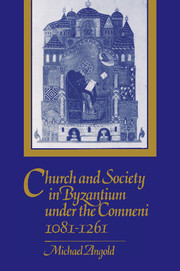Book contents
- Frontmatter
- Contents
- A note on transliteration
- List of abbreviations
- Introduction
- Introduction to paperback edition
- PART I THE ELEVENTH CENTURY
- PART II EMPERORS AND PATRIARCHS
- PART III THE BISHOP AND LOCAL SOCIETY
- 5 The framework
- 6 Theophylact of Ohrid
- 7 Michael Italikos and George Tornikes
- 8 Eustathius of Thessalonica
- 9 Michael Choniates
- 10 John Apokaukos
- 11 George Bardanes
- 12 Demetrius Chomatianos
- PART IV MONASTERIES AND SOCIETY
- PART V RELIGION AND SOCIETY
- PART VI EXILE 1204–1261
- Bibliography
- Index
9 - Michael Choniates
Published online by Cambridge University Press: 06 July 2010
- Frontmatter
- Contents
- A note on transliteration
- List of abbreviations
- Introduction
- Introduction to paperback edition
- PART I THE ELEVENTH CENTURY
- PART II EMPERORS AND PATRIARCHS
- PART III THE BISHOP AND LOCAL SOCIETY
- 5 The framework
- 6 Theophylact of Ohrid
- 7 Michael Italikos and George Tornikes
- 8 Eustathius of Thessalonica
- 9 Michael Choniates
- 10 John Apokaukos
- 11 George Bardanes
- 12 Demetrius Chomatianos
- PART IV MONASTERIES AND SOCIETY
- PART V RELIGION AND SOCIETY
- PART VI EXILE 1204–1261
- Bibliography
- Index
Summary
michael Choniates was a pupil of Eustathius and, as we have seen, held him in the highest regard. His career was rather different from that of his master. For one thing he held no teaching position in Constantinople. He began his career as secretary to the Patriarch Michael Ankhialos' (1170–8). He was then singled out in 1182, still only in his early forties, by the Patriarch Theodosius Boradiotes (1179–83) for promotion to the important see of Athens. There seems not to have been that struggle for preferment which faced Eustathius at the start of his career. The origins of Michael Choniates and of his younger brother, the historian Nicetas, are nonetheless obscure. As their surname betrays they came from Chonai, a town of western Asia Minor close to the Turkish frontier. They had the backing of the saintly metropolitan of Chonai, also called Nicetas, whose reputation counted for something at the imperial court. Their family may have been important locally, but nothing more. It is therefore likely that the brothers owed their success in the first instance to their undoubted ability rather than to family background. But ability could still bring wealth and social prestige. In Michael's case the best evidence is provided by the impressive library that he brought with him from Constantinople to Athens. His brother Nicetas had more tangible signs of wealth in the property he accumulated at Constantinople.
- Type
- Chapter
- Information
- Church and Society in Byzantium under the Comneni, 1081–1261 , pp. 197 - 212Publisher: Cambridge University PressPrint publication year: 1995

